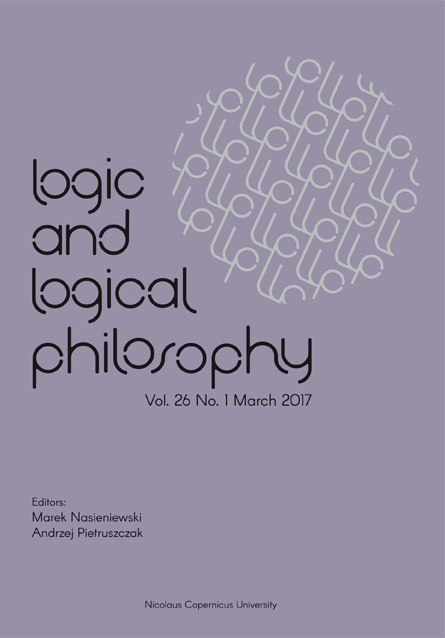First Degree Entailment, Symmetry and Paradox
DOI:
https://doi.org/10.12775/LLP.2016.028Keywords
first degree entailment, paradox, symmetry, models, theoriesAbstract
Here is a puzzle, which I learned from Terence Parsons in his “True Contradictions” [8]. First Degree Entailment (FDE) is a logic which allows for truth value gaps as well as truth value gluts. If you are agnostic between assigning paradoxical sentences gaps and gluts (and there seems to be no very good reason to prefer gaps over gluts or gluts over gaps if you’re happy with FDE), then this looks no different, in effect, from assigning them a gap value? After all, on both views you end up with a theory that doesn’t commit you to the paradoxical sentence or its negation. How is the fde theory any different from the theory with gaps alone?
In this paper, I will present a clear answer to this puzzle – an answer that explains how being agnostic between gaps and gluts is a genuinely different position than admitting gaps alone, by using the formal notion of a bi-theory, and showing that while such positions might agree on what is to be accepted, they differ on what is to be rejected.
References
Nuel Belnap, “How a computer should think”, pages 30–55 in G. Ryle (ed.), Contemporary Aspects of Philosophy, Oriel Press, 1976.
Nuel Belnap, “A useful four-valued logic”, pages 8–37, chapter 2, in J.M. Dunn and G. Epstein (eds.), Modern Uses of Multiple-Valued Logic, D. Reidel, 1977. DOI: 10.1007/978-94-010-1161-7_2
Ross T. Brady, “The simple consistency of a set theory based on the logic CSQ”, Notre Dame Journal of Formal Logic, 24, 4 (1983): 431–449. DOI: 10.1305/ndjfl/1093870447
J. Michael Dunn, “Intuitive semantics for first-degree entailments and ‘coupled trees’”, Philosophical Studies, 29, 3 (1976): 149–168. DOI: 10.1007/BF00373152
Paul C. Gilmore, “The consistency of partial set theory without extensionality”, pages 147–153 in Axiomatic Set Theory, volume 13 of Proceedings of Symposia in Pure Mathematics, Providence, Rhode Island, 1974, American Mathematical Society. DOI: 10.1090/pspum/013.2/0360271
Lloyd Humberstone, The Connectives, The MIT Press, 2011.
Saul Kripke, “Outline of a theory of truth”, The Journal of Philosophy, 72, 19 (1975): 690–716. DOI: 10.2307/2024634
Terence Parsons, “True contradictions”, Canadian Journal of Philosophy, 20, 3 (1990): 335–354. DOI: 10.1080/00455091.1990.10716495
Graham Priest, An Introduction to Non-Classical Logic: From if to is, Cambridge University Press, Cambridge, 2008. DOI: 10.1017/CBO9780511801174
Greg Restall, “Multiple conclusions”, pages 189–205 in Petr Hájek, Luis Valdés-Villanueva, and Dag Westerståhl (eds.), Logic, Methodology and Philosophy of Science: Proceedings of the Twelfth International Congress, KCL Publications, 2005. http://consequently.org/writing/multipleconclusions
Greg Restall, “Assertion, denial and non-classical theories”, chapter 6 in K. Tanaka, F. Berto, E. Mares, and F. Paoli (eds.), Paraconsistency: Logic and Applications, volume 26 of Logic, Epistemology and the Unity of Science, Springer 2013. DOI: 10.1007/978-94-007-4438-7_6
Greg Restall, “Pluralism and proofs”, Erkenntnis, 79, 2 (2014): 279–291. DOI: 10.1007/s10670-013-9477-9
Greg Restall, “Assertion, denial, accepting, rejecting, aymmetry and paradox”, pages 310–321 in Colin R. Caret and Ole T. Hjortland (eds.), Foundations of Logical Consequence, Oxford University Press, 2015. DOI: 10.1093/acprof:oso/9780198715696.003.0011
Richard Routley and Valerie Routley, “Semantics of first degree entailment”, Noûs, 6, 4 (1972): 335–359. DOI: 10.2307/2214309
Igor Urbas, “Dual-intuitionistic logic”, Notre Dame Journal of Formal Logic, 37, 3 (1996): 440–451. DOI: 10.1305/ndjfl/1039886520
Peter W. Woodruff, “Paradox, truth and logic. Part I: Paradox and truth”, Journal of Philosophical Logic, 13, 2 (1984): 213–232. DOI: 10.1007/BF00453022
Downloads
Published
How to Cite
Issue
Section
Stats
Number of views and downloads: 1337
Number of citations: 2







